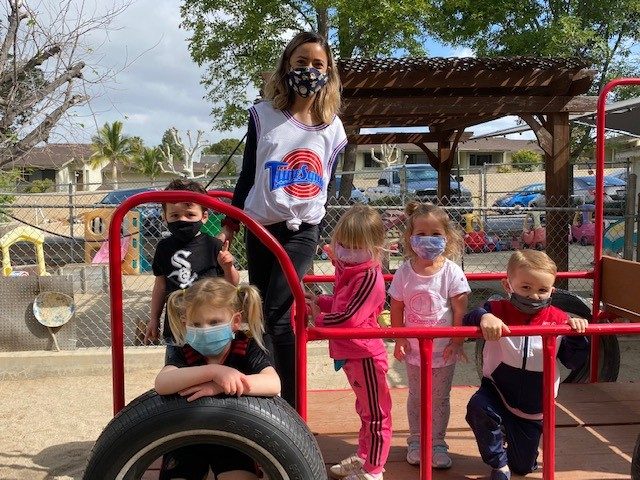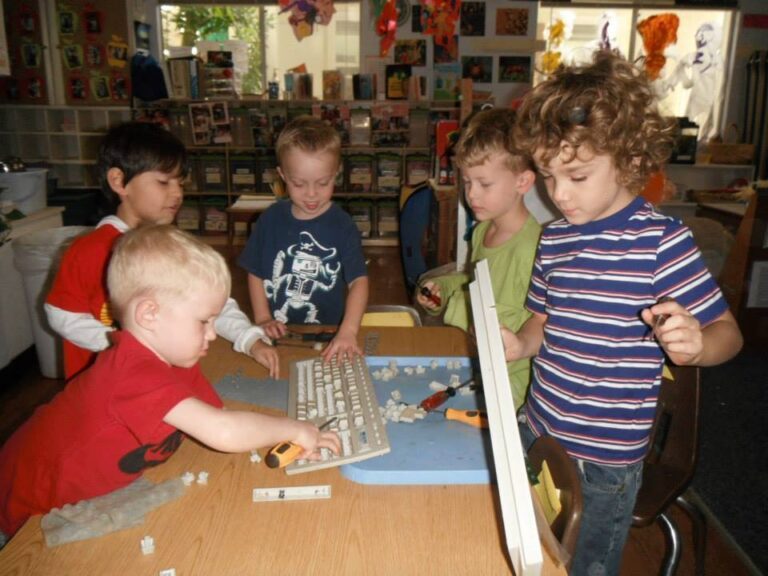
Children’s Preschool Education: 5 Reasons Why It Is Important
For some parents, the essential part of preschool education is the social skills learned during these years. It is no surprise that these skills are necessary for children before they enter formal schooling. There are many benefits to a quality children’s preschool and making the right choice can be a daunting task for parents. It is important to keep the points below in mind when collecting enough information to find the best match for the family.
Children's Preschool Teaches Children How to integrate in Society
Children in Preschool will be exposed to sharing, taking turns, and being kind to others. They also learn to follow simple instructions, interact positively with adults and solve problems with their classmates and friends. When a child is in a preschool class, they learn how to be a part of a community. They also interact with children with related interests and similar needs.
There are national standards for children’s preschool education in the United States, these standards guide quality and state that all teachers in a preschool environment should be responsible for teaching social and emotional skills such as:
• relating to others
• expressing needs, wants & feelings in a positive way
• being aware of the world around them
• self-help skills (dressing, eating, toileting)
With these skills, children will be equipped to develop other skills.
Children's Preschool Is A Steppingstone
In a children’s preschool setting, children learn how to participate in social activities. They will learn how to share, recognize letters and numbers, count, and communicate with others. In elementary school, they will learn how to read and write by using the base knowledge received in preschool. A survey of parents found that 93% felt that attending children’s preschool positively impacted their child’s readiness for kindergarten. This includes increased communication skills and increased interest in learning new things. The same survey also found that parents believe the quality of a children’s preschool program is inversely proportional to the likelihood that the child will need remedial help in elementary school classrooms and beyond.
Of course, there’s plenty of research that supports this. A study published in 2013 in the Journal of Applied Developmental Psychology found that children who attended preschool had better cognitive and social skills in fifth grade when compared with those who did not participate in preschool.
Another study conducted by Tom Loveless at the Brookings Institution found that preschool graduates scored higher on standardized tests and were more likely to attend college. These examples provide conclusive evidence that attending preschool has a significant and positive impact on a child’s future development and success, continuing through adolescence and beyond. There should be no surprise that children’s preschool provides an academic advantage later in life, especially, if it is guided by the national quality standards.
Children Need to Be Challenged

Children need to have opportunities to stretch themselves and be challenged with new skills. This is because if they’re not challenged, their minds may not grow to their full potential.
Children’s preschools are designed for children to learn new things, which opens the possibilities of lessons in the future. Children are also encouraged to play, read, sing, dance, do artwork, and more. The social aspect of these programs is also beneficial as they teach children how to make friends and interact with others. Appropriate preschool education can help your child’s social skills develop faster by being surrounded by other children learning similar things.
Preschools also provide an environment that fosters independence and self-esteem through curriculum choices. They might choose what they eat during meals or what project they want to work on next. They can explore their world without feeling too overwhelmed or restricted because there is always someone supporting them on the other side of the table or on the carpet with them.
Preschool Provides Play Opportunities
The preschool years are essential for 3-5-year-olds to build the skills they need to succeed later in life. Social and emotional development skills are required for future success in school, work, relationships, and society as adults as well.
Preschoolers are starting to form their sense of self and they begin to figure out who they are. Consequently, by giving them opportunities to explore, try new things, make mistakes, and have adult’s love and support, they solidify their sense of self-worth because they learn new things in a positive and nurturing environment. These experiences will help children develop confidence by showing them that they can do complex tasks even if it takes practice.
Allowing children in preschool to use age-appropriate tools with proper supervision is also a vital part of learning. These tools might include different methods for telling the time, using standard measuring devices (i.e., non-standard measuring cup for use with playdough), and technology appropriate to their age group. There are many activities that preschool teachers can do to assist children in reaching these skills. Your little ones will surely get these benefits if you will bring them to Children’s Village, the best children’s preschool and childcare center.
Preschools provide ample play opportunities. Inside children’s preschool, they will be encouraged to explore the world around them, engage with other children, and participate in different activities. The more opportunities there are for play, the more likely your child will learn the skills that will help them later on in life.
When parents are looking for children’s preschool, besides the need for childcare, they should also want to enhance their children’s life experiences. One way to do this is by making sure the preschool choice has a strong educational foundation because it is never too early to start thinking about children’s education and enrolling them in a quality preschool and childcare center. A quality preschool program typically ranges from 3 hours to 6 hours per day, two to five days a week, lasting 18 months to 2 years. The essential part of a preschool education is the social skills embedded in meaningful activities learned during these years.
To give parents a clear idea of why children’s preschool education is important for growth, a list has been compiled below.
Learning Is More Than Just Academics
Yes, a children’s preschool includes appropriate academics such as reading and math, but it also has other important components such as, positive problem-solving and conflict resolution. These are key social skills that affect the children’s ability to make friends and to effectively participate in group activities, preparing them for entering the elementary school years and increasing their chances to be successful now and in the future. A well-rounded education is vital for children because it will help them succeed academically and mentally. It will give them the tools to face the challenges of the world and meet their goals. Potentially increasing their chances to be confident and happy in their lives.
Let’s look at some of the skills that preschoolers learn.
Social Skills
In children’s preschool, they learn social skills as they play with others during activities and events. This is a crucial time for children to develop such essential skills because they learn to understand how others think and feel. The more exposed children are to social situations that require them to adjust to others, the better they will relate to one another in the future, improving their chances of long-lasting relationships.
Problem-Solving
Preschoolers learn to solve problems during their everyday activities. They will take what they have learned from one situation and use it again in a new situation. For example, if your child spills something while pouring, he may try holding the container closer next time or turn it around, as they need to do with a puzzle. Problem-solving skills are transferable to different situations and very helpful in life, especially when children encounter different obstacles in the future.
Creativity
Creative activities teach preschoolers to express themselves and their feelings using art, music, or drama. These activities not only give children a chance to learn about themselves and expand their imaginations, but they also help them develop different ways to think, see and do things. For example, sharing ideas in front of the class takes courage because exposes them to others’ questions and comments. It allows children to learn that making mistakes is not a big deal, and they can recover quickly if something does not go right the first time. Qualified adult/teacher support during this process is crucial for the development of positive self-esteem and self-image.
Cognitive Skills
Academic lessons are an essential part of preschool education. Children will learn letters, numbers, shapes, colors, vocabulary words, and how to write their names. These lessons help children learn and grow as they prepare for school. A quality preschool includes also other experiences, such as natural and physical science. Science incorporates basic concepts of observing, comparing, classifying, measuring, and predicting. There is much more that can be learned inside children’s preschool, but these are just a few examples. When you look at all the things that preschoolers do each day, it’s clear they’re learning more than meets the eye!
Motor Skills
Children’s preschool will also challenge their fine and gross motor skills. By the time children graduate from Children’s Village Preschool, they’ll have had ample practice with life skills that most people probably take for granted. They will develop self-help skills during meals, toileting, and other parts of their daily routine. In addition to an ample outside environment surrounded by nature.
CONCLUSION
Being a parent is hard enough without worrying about what is taught in children’s preschool. Parents want to make sure that their children have the opportunity to learn in a nurturing, safe and fun environment that will help them grow. Paying appropriate due diligence in the choosing process will get you started on the right path. Luckily, many options in the Orange area offer preschool education for children.
At Children’s Village Preschool or Orange, we offer different activities and opportunities for children to explore their imagination, creativity, and develop their essential skills. Check our Facebook Albums to see how busy our children are.
Choosing the right school for your child can be a difficult decision that may significantly impact their future. Take some time to research each option and make sure the school you choose has the qualities you are looking for and meets some of the national standards.
Start with Children’s Village Preschool of Orange. If you want to find out more about us, just click here.

